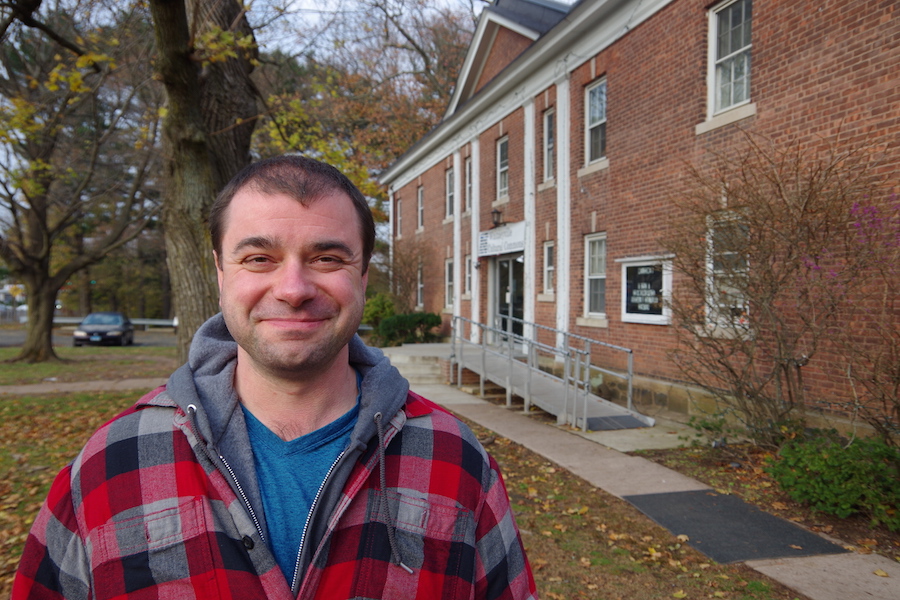
Hamden | Arts, Culture & Community
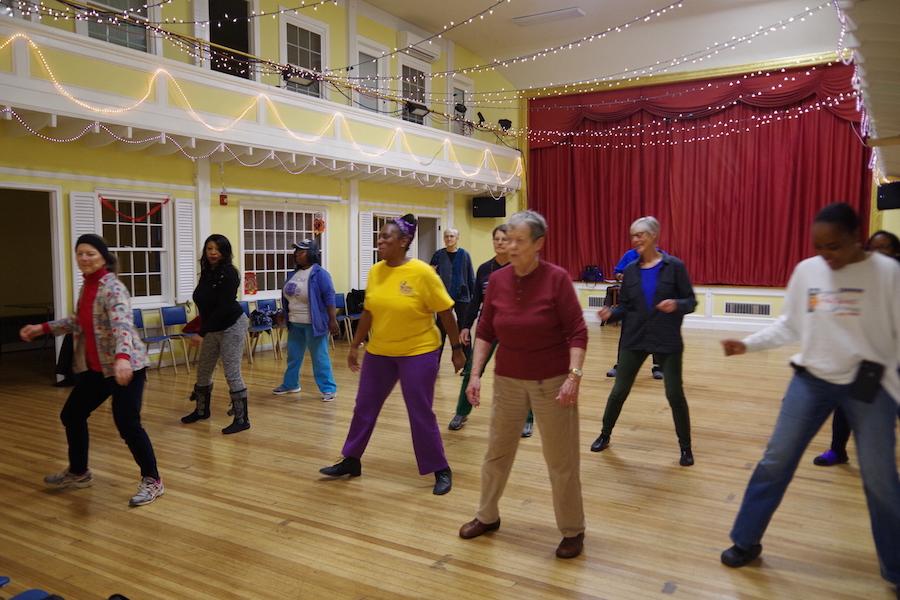
| Xan Walker's line dancing class. Leah Andelsmith Photos. |
On a recent Friday, a small group of line dancers gathered in the warm auditorium of the Whitneyville Cultural Commons (WCC). They sat next to good friends to change into their dancing shoes and made advance requests for favorite songs. Instructor Xan Walker was full of smiles as she started the class. She called out the steps and the group moved in time behind her.
Walker’s monthly line dancing class is just one small slice of the offerings at the WCC, the Hamden community center that sits on the tree-filled green at the corner of Whitney and Putnam Avenue.
The property once belonged to the Whitneyville Congregational Church. It consists of two buildings: the historic church at 1247 Whitney Avenue, built in 1834, and the parish house next door. Built in the 1920s, the parish house features a period ballroom with high ceilings, hardwood floors, and a stage.
Small offices ring the balcony above the auditorium, along with a conference room, podcast studio, and consultation rooms for therapists and other wellness practitioners.
Also upstairs is the Oak Room, a studio that sports the same warm, yellow walls and hardwood floors found in the auditorium, as well as a picture window with a treetop view.
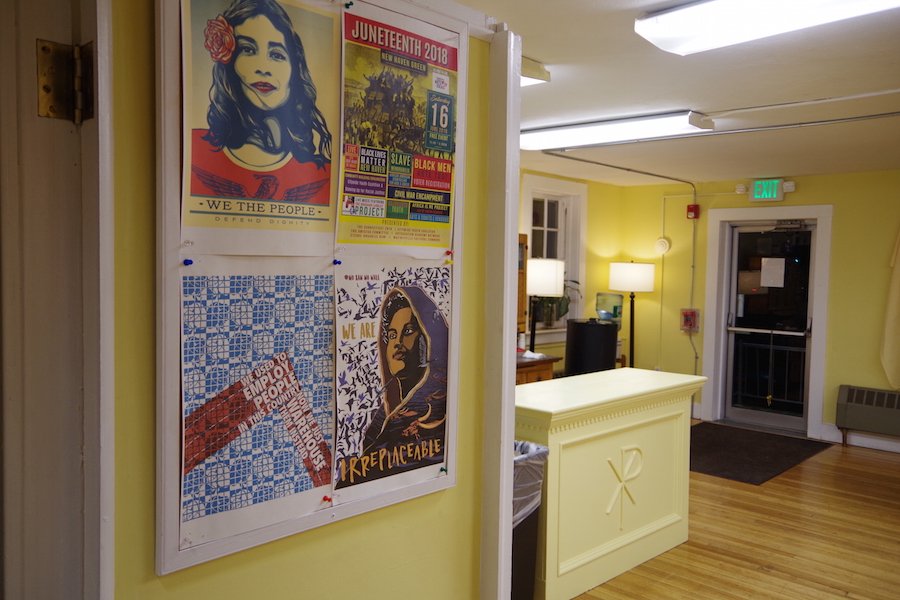
It hasn’t always been in the shape it is today. In 2014, 180 years after its founding, the church was run down and its congregation was running out of money. That’s when Hamdenites Jen Brosious and Laine Harris stepped in to purchase the property and renovate it for the community. Robert Sheiman, who was a long-time friend of the couple, got involved right away, creating a business model for a self-sustaining community center. He now serves as executive director of the space, where he has been for over four years.
“In order to realize long-term sustainability, we needed not a rescue, but a mission and vision,” he said in a recent interview. So in October 2015, the group created a nonprofit organization which purchased the property back from the couple.
In those early days, Sheiman and Harris absorbed all of the work. The center’s first large event showed that the work was paying off: in November 2015, they welcomed New Haven Farms’ annual contra dance the same day they finished painting the balcony panels. Close to 180 people showed up.
“Our own ingenuity—or our ability to learn something fast enough—determined whether or not we were able to provide services for the clients,” Sheiman said. “We were making the rules up as we went along. People told us what they wanted and needed, and we endeavored to supply it.”

| Robert Sheiman: Building a community resource center. |
Now, there’s a packed slate of programs that the building hosts each month. Where there was once a ballroom, there’s an auditorium that has become the heart of WCC, hosting dances, lectures, concerts and theater productions as well as church services and private parties. The Oak Room saw Hello Boutique’s launch of an online business, and migration to a nearby storefront on Whitney Avenue after closing its downtown shop. The Royal Scottish Country Dance Society uses the Oak Room for classes.
Both buildings also have lower levels with additional function rooms. On a recent Saturday, WCC hosted nearly 400 people attending baby showers and birthday parties staggered throughout the day. And between the two buildings, there’s a patio used for both the annual Whitneyville Fall Festival and Compassionfest, a vegan festival in its fourth year that the WCC helped incubate.
But stepping inside the church sanctuary is like stepping back in time. With its red carpet, white walls, and dark wood accents, the space is defined by the traditional New England box pews and an altar framed by a tall, white archway. The sanctuary is used for several church services during the week, but it’s also a natural location for concerts. The Ohm Shalom Trio has played there, as well as the Greater New Haven Community Chorus Chamber Choir. Sheiman said he still wants to find a theater company that wants to pack the pews.
Sheiman sees WCC as a complement to 21st century libraries. While it isn’t free—the WCC doesn’t have the funding to do that—it operates in a similar way, lending out tech resources (several startups have had their modest beginnings in the space) and expertise.
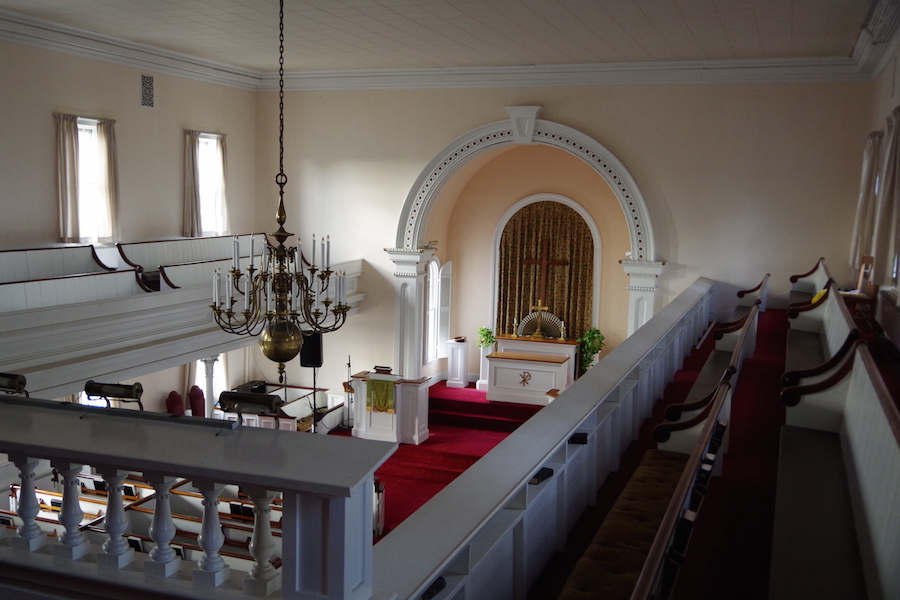
“It’s a community resource center,” Sheiman said, adding that there are policies against hate speech and exclusion. “We have the space, tools, and knowledge for people to use as they see fit.”
WCC’s work grows directly out of what community members need. The modest revenue stream is what keeps WCC sustainable, allowing the organization to pay for the mortgage, utilities, and limited staff that keep the space open. Without that income, “I’d go bankrupt.”
In addition to creating a sustainable model for WCC itself, Sheiman likes to keep an eye on economic development in the community. Sheiman said he sees the non-profit’s coworking and office spaces as an incubator. He aims to nurture fledgling businesses by giving them access to the infrastructure they need without the prohibitively large up-front costs that usually come attached.
“A culture of mass sharing does not exist yet … there’s a sense that you can’t be taken seriously without private property,” he said. “I want to try to change that culture of ownership.” Then, after a thoughtful silence, he added, “But I don’t know what a culture of sharing looks like.”
By 7:30 that Friday evening, Walker was well on her way to achieving it, though. A dozen dancers were on the floor at her class, with more trickling in every few minutes. A latecomer was greeted with a cheerful chorus of “Hey!”
“I didn’t think you were coming!” someone exclaimed.
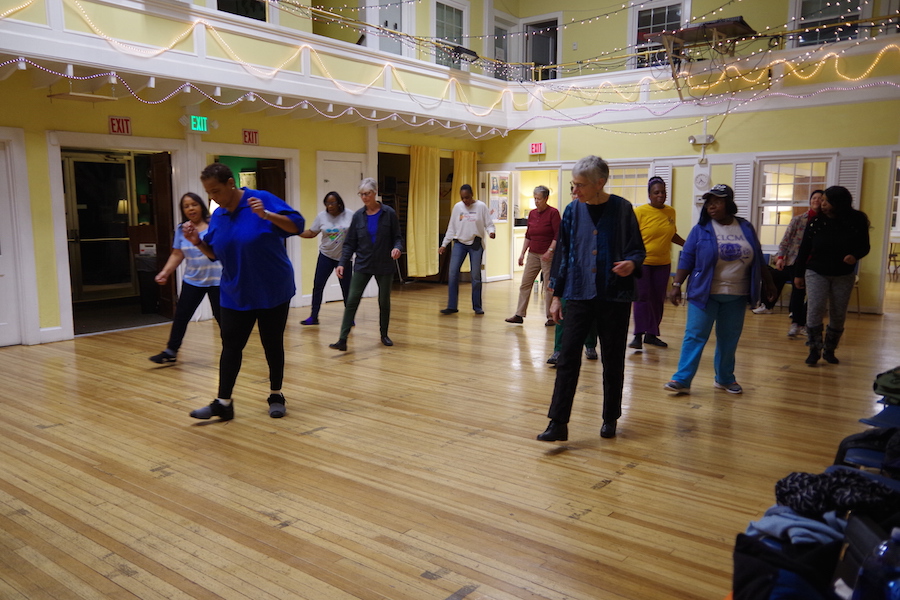
Walker herself worried that attendance would lag—it was Black Friday, after all—but regulars didn’t take the day off to shop. In fact, more dancers showed up than expected, including some who were brand new to the class.
“I didn’t expect all those people,” Walker said. “I was really surprised.”
Walker first used the ballroom at WCC three years ago to host a dance-a-thon. That group outgrew the space right away, but Sheiman saw an opportunity for community connection, and he asked Cathedral of the Holy Spirit—one of several churches who make their home at WCC—if they were interested in adding a line-dancing class to their programming.
“That only lasted for a few months, but Robert wanted to keep it going, so I stayed on,” Walker recalled. She opened the scope of the class to include secular as well as gospel music, and her students keep coming back.
Walker said that her students “like the social part of it first and foremost”—the regulars know each other and are always asking after one another’s health and families. But they also like the exercise. There are folks like East Haven retiree Carmelita Morales, who loves collecting steps for her Fitbit.
“I can get almost four to five thousand steps in one class,” she said.
New Haven retiree Donna Turner dances four to five times a week in Walker’s classes and said the challenge of mastering new line dances is a big draw.
“I know 46 dances,” she said. And she wants to keep learning more.
“It has grown into its own thing—more of a community event,” Walker reflected. She added that having a space like WCC really makes a difference for the group.
“The floor is great and it’s a nice size. It’s bright and cheerful and there’s a good sound system,” she said. “I like the space inside and outside. It has parking and it’s easy to get to from different parts of Connecticut.”

| La Luna Milonga is a Monthly Tango Night (Lessons and dance club) that will be celebrating its fourth anniversary, and four years of using WCC, on January 12th. Mariana Fresno Photo. |
Sheiman said he thinks a lot about what it means to live in a world brimming with knowledge and resources that is nonetheless rife with inequality. And he has big dreams for what could—or should—be.
“Let’s take the best of what we have to offer and package it, to be given to the community without debt, but with a plan for maintenance,” he said. “It could be offered anywhere in the world that’s needed.”
He views WCC as a “prototype project,” and said that the organization has plans to expand the model in communities across the state. Those include a collaboration with Church of the Redeemer in New Haven, which has scheduled its final service for April 2019. Their members will “transplant” to other churches and the group has turned to WCC for help in repurposing the church’s property, continuing their tradition of providing community space.
Sheiman’s most ambitious hopes involve having relationships in cities across Connecticut with organizations that want to open up their space.
“It’s a steep learning curve,” he said about the process of making space available for widespread community use. It’s a process that requires a lot of capital.
But, he added, “If we can be successful, there will be an ever-growing need for what we do.”
For now, Sheiman’s focus is on closing up the organization’s budget shortfall by raising money for WCC’s annual fund. Sheiman also hopes to grow WCC’s membership program.
“It’s a way to step through the door,” he says. “A way for people to get involved beyond a one-time event and become a person we can reach out to.” Sheiman wants to see the program thrive.
In the meantime, WCC will continue to provide a home for a wide variety of community groups and events. Sheiman is most looking forward to Jan. 7, which marks the next installment of the Deeper Change Forum hosted by New Haven social justice organization Co-Creating Effective & Inclusive Organizations (CEIO). The program is called “Conscious Co-Creation: A Path Toward Liberation” and features CEIO co-founder Niyonu Spann, who Sheiman admires as “a catalyst for creating change in Greater New Haven.”
WCC has hosted a half-dozen Deeper Change Forums, and Sheiman says they are “probably my favorite events,” a statement that has deep roots in his motivation in running a space like WCC.
“These events tell me this is a space in which tough conversations can happen,” said Sheiman, who takes the events as a sign that the organization is on track with its mission to share resources and provide social, cultural, and economic support to the community.
“Public space is the roof under which forward movement towards a just society happens,” he said. “Where else is that going to occur?”
Whitneyville Cultural Commons is a 501c3 organization and they are accepting donations through the end of the year.

